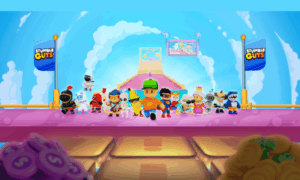
Stumble Guys
Popular Now
Introduction
Stumble Guys has become a popular multiplayer party game, captivating players with its vibrant and chaotic obstacle courses. It offers an entertaining and unpredictable experience, where players control cute, clumsy characters trying to outlast each other through various wacky challenges. However, as with many online multiplayer games, Stumble Guys faces its fair share of issues that impact its enjoyment. One of the most persistent and frustrating problems for players is the inconsistency and unfairness of the matchmaking system, which can undermine the fun and competitiveness of the game. In this article, we will delve into the specifics of this issue, exploring how it affects gameplay and examining potential solutions that could improve the experience for all players.

The Basics of Stumble Guys: A Fun and Chaotic Experience
What is Stumble Guys?
Stumble Guys is a free-to-play multiplayer game that features a battle royale format. Players are dropped into an obstacle course where they must race, jump, and dodge various challenges to be the last one standing. The game is heavily inspired by the popular TV show Wipeout, where players face an ever-evolving set of challenges. The primary appeal of the game lies in its unpredictability—no two rounds are ever the same.
The Charm of Chaos
The game’s simple controls, bright visuals, and whimsical characters make it accessible to players of all ages. Its chaotic gameplay and humorous ragdoll physics ensure that each round is filled with moments of surprise and laughter. Whether it’s a well-timed jump that results in an unexpected fall or a narrow escape from an obstacle, Stumble Guys thrives on fun, even in defeat.
The Problem with Matchmaking: An Unfair Advantage?
A Flawed System
One of the major criticisms leveled against Stumble Guys is its matchmaking system. While the game attempts to balance players of similar skill levels against each other, the reality is often far different. Players frequently report being matched with others who are either far more skilled or significantly less experienced, leading to frustration and an imbalanced playing field. This issue arises from the game's ranking system, which fails to adequately consider factors like player experience, skill, and progress within the game.
How Matchmaking Affects the Player Experience
When players are matched with others who either dominate the competition or barely know the basics, it detracts from the overall experience. More skilled players can quickly eliminate newcomers, while less experienced players struggle to keep up with seasoned veterans. This dynamic leads to a sense of unfairness that can deter new players from continuing and can make the game feel like a frustrating uphill battle for experienced ones. As players advance through the game, they expect more challenging competition, but instead, they often find themselves either breezing through rounds or getting eliminated without a fair chance.

The Role of Randomization: Is It Too Much?
The Impact of Random Elements
In Stumble Guys, randomness is a key element of the game. Each obstacle course is designed to be unpredictable, which is what makes it exciting and entertaining. However, this randomness can sometimes go too far, especially when combined with an already unbalanced matchmaking system. When players face challenges that are heavily randomized, it can sometimes seem as though victory is determined more by luck than skill. This randomness, paired with the frustrations caused by uneven matchups, can lead to a feeling of helplessness in the game.
Randomness in the Context of Progression
The issue of randomness also impacts player progression. While randomness can make rounds entertaining in the short term, it becomes frustrating when players feel they are repeatedly losing to random events rather than their own ability. For example, a player might perform well through an obstacle course only to be eliminated at the final stage due to an unexpected change in the environment or a random mistake. In these moments, it can feel like progression is out of the player’s hands, which ultimately detracts from the sense of achievement in the game.
Player Skill vs. RNG: A Battle for Control
The Frustration of Losing to Randomness
One of the biggest frustrations voiced by players is the feeling of losing to randomness (RNG) rather than a lack of skill. Stumble Guys requires quick reflexes and strategy, but the game’s randomness often overpowers skill in determining outcomes. In particular, many players have pointed out that random events, such as the placement of obstacles or sudden shifts in the environment, can make it seem as though skill is irrelevant.
A Lack of Consistent Challenges
The randomness inherent in the game means that no two matches are the same. While this is often viewed as a strength of Stumble Guys, it also means that the challenges players face are inconsistent. A skilled player might dominate a course, only to lose in the final round due to a randomly placed obstacle or a poorly timed event. The inconsistency makes it difficult for players to improve, as they cannot rely on a consistent set of challenges that allow them to hone their skills.

Matchmaking and the Impact on Player Retention
Why Balanced Matchmaking Matters
In any competitive multiplayer game, matchmaking is crucial for player retention. If players are repeatedly matched with opponents that are too easy or too difficult, they are likely to become frustrated and stop playing. This is particularly true for games like Stumble Guys, which rely on players returning for multiple rounds of chaos. Unbalanced matchmaking can cause a player to feel as though they are either wasting their time or constantly being outclassed, leading them to abandon the game.
The Need for a Better Ranking System
A better ranking and matchmaking system could alleviate some of these frustrations. By better assessing player skill, experience, and progress, Stumble Guys could provide a more balanced and fair competition. This would ensure that players are matched with others who are at a similar skill level, making the game more enjoyable and encouraging continued play.
The Role of Social Dynamics in Multiplayer Games
Cooperation vs. Competition
Stumble Guys is primarily a competitive game, but it also has social elements. Players can team up and communicate with friends to increase their chances of success. However, the game's focus on competition often overshadows its potential for cooperation. The aggressive nature of multiplayer competition can alienate players who prefer a more cooperative or team-based experience. This imbalance can exacerbate the frustration of losing, as players feel as though the game is designed solely to pit them against others, without providing room for camaraderie or teamwork.
The Pressure to Keep Up
As with any competitive game, there is an inherent pressure to keep up with other players. This pressure can feel amplified in a game like Stumble Guys, where the randomness and unpredictability of matches can make players feel out of control. Coupled with the frustrations of matchmaking, the pressure to perform can become overwhelming, leading some players to quit or lose interest in the game.

Potential Solutions: What Could Improve Stumble Guys?
Enhancing Matchmaking Algorithms
To address the issue of unfair matchmaking, one potential solution would be to improve the game's matchmaking algorithm. By taking into account more factors like skill level, win rate, and progression, the game could create more balanced matches that provide a fairer and more enjoyable experience for players. Such improvements would allow for better skill-based matchmaking, helping players find opponents who are on a similar level.
Introducing More Skill-Based Challenges
Another solution could be to introduce more skill-based challenges within the game, reducing the reliance on random events. By offering challenges that require strategy and skill to overcome, Stumble Guys could create a more consistent and satisfying progression system. This would ensure that players feel they are improving, rather than being held back by randomness.

Conclusion: Striking a Balance Between Fun and Fairness
Stumble Guys has the potential to be a fun, exciting multiplayer experience, but it currently struggles with issues related to matchmaking and randomness. The game's reliance on both factors creates a sense of unfairness that can diminish the experience for players. By improving the matchmaking system and introducing more skill-based challenges, Stumble Guys could provide a more balanced, rewarding experience for all players. In the end, it’s not just about creating chaos and fun—it’s about making sure players feel they have a fair chance to succeed based on their abilities, not just luck.






















